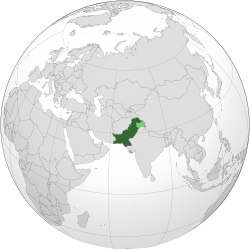 Land controlled by Pakistan shown in dark green, land claimed but not controlled shown in light green | |
| Country | Pakistan |
|---|---|
| Continent | Asia |
| Regulator | Pakistan Telecommunication Authority |
| Numbering plan type | Closed |
| Numbering plan | National Numbering Plan Pakistan |
| Last updated | 23 July 2010 |
| Country code | +92 |
| International access | 00 |
| Long-distance | 0 |
Telephone numbers in Pakistan are ten digits long. Landline numbers and mobile numbers have different structures. Geographically fixed landline are prefixed by an area code which varies in length depending on the significance of the place. Mobile numbers are prefixed followed by a two-digit code indicating the telephone operator. The international country code for Pakistan is +92.